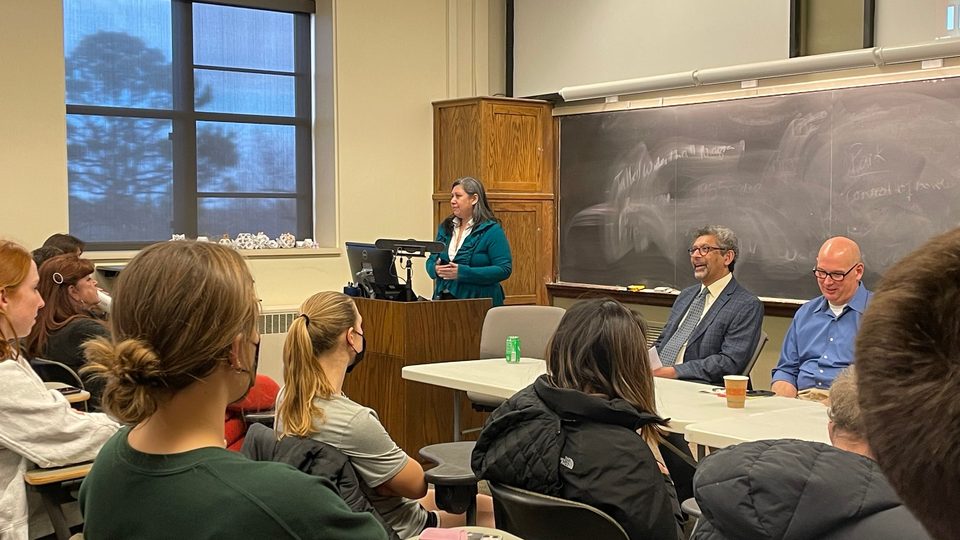Faculty Panel Explores Causes and Consequences of Russia’s Invasion of Ukraine
Seven faculty members participated in the panel, including Adeeb Khalid of the history department, Paul Petzchsmann of European studies, Diane Nemec Ignashev of German and Russian, and Dev Gupta, Greg Marfleet, Christina Farhart, and Tun Myint of the political science department.

On Wednesday evening, the political science department, Center for Global and Regional Studies, and public policy program held a panel discussion regarding the Russian invasion of Ukraine.
Seven faculty members participated in the panel, including Adeeb Khalid of the history department, Paul Petzchsmann of European studies, Diane Nemec Ignashev of German and Russian, and Dev Gupta, Greg Marfleet, Christina Farhart, and Tun Myint of the political science department.
On Feb. 24, 2022, Russian forces invaded Ukraine after weeks of military buildup on the border. The capital city of Kyiv has been under attack for the past week, and although information coming out of the region has been limited, there has been significant international discussion surrounding the conflict.
“We wanted to hold this panel in order to process what’s happening together, as opposed to each of us individually doom scrolling the latest news updates, interspersed with consuming the latest memes about Volodymyr Zelenskyy,” Gupta said in her opening remarks.
Following the opening comments, the panel walked through the historical context behind Russia and Ukraine’s relationship before addressing various facets of the current situation in Ukraine and surrounding countries.
Khalid, the Jane and Raphael Bernstein professor of Asian studies and history and director of Middle East studies, spoke first on the historical causes and context surrounding the conflict. Khalid explained the historical relationship between Russia and Ukraine, as well as the history behind NATO’s formation and current position. Khalid also mentioned the discourse calling the current Russian actions unprecedented and drew a comparison between the current invasion of Ukraine to the United States’ 2003 invasion of Iraq.
“[Calling this action unprecedented] works only if your memory goes back to 2004 and not a year before,” Khalid said. “I think we should ask if or why this is different, and why the reactions have been so different.”
Gupta, professor of political science and president of the faculty, built on Khalid’s historical analysis with her own analysis of Russian nationalism and Vladimir Putin’s quest for Russian state legitimacy.
“The Russian state has used Soviet participation in the victory over the Axis powers in World War II as a national legitimating myth that provides a sense of unity, purpose, shared national accomplishment, and which allows Putin to make a connection between modern-day Russia and an undiminished, powerful Soviet Union,” she said.
Gupta also touched on the spread of misinformation surrounding far-right political forces in Ukraine.
“This legitimating mythology helps contextualize why we might see references to neo-nazis and to genocide in a conflict where there is not any factual evidence of genocide happening and where the government of the country being invaded is led by a Jewish descendant of Holocaust survivors,” she said.
Farhart, assistant professor of political science, continued the conversation on misinformation, disinformation and propaganda.
“[Misinformation] is used to mislead, to mock, to dismiss allegations against those in leadership, and often to make political opposition look bad,” she said. “Russia has long been known as a ‘master of mischief’ on social media and the internet. Its national propaganda machine uses social and state-backed media to deceive or disempower their opposition. We’ve seen this take place in meddling with other countries’ elections, and the Russian government is now trying to convince its own people that there is genocide happening against Russian separatists in the Ukraine as part of the justification for their invasion into Ukraine.”
Marfleet, director of public policy and professor of political science, explained the current conflict and Russian military movements.
“The Russian military’s strategy is all about moving heavy equipment on railroads to places. The problem is they can only go to the end of the railroad…anything about 90 miles from the end of a railhead and the Russians’ logistics collapse,” Marfleet said. “We’re seeing some of that happening now; the 40-mile convoy is struggling. As Russia moves further into Ukraine, we’re going to see the challenge of logistics.”
Petzschmann, a professor of European studies whose research is often centered on the European Union, touched on the repercussions of the conflict in the rest of Europe. He addressed the current actions being taken by the EU in response to Russia’s invasion and noted that this crisis prompts the EU to think about its energy dependence on Russia, as well as its security dependence on NATO.
Myint, professor of political science, followed with a broader international perspective and spoke on the United Nations’ role and responsibilities. He remarked about how the conflict may affect China’s future calculations about its ambitions toward Taiwan and elsewhere in the region. He also spoke of the implications for food security, given that Ukraine and Russia are both agricultural exporters, and countries in places like sub-Saharan Africa import a considerable amount of wheat from the region.
The presentation section of the panel concluded with comments from Ignashev, who serves as chair of German and Russian.
With multiple friends and family members in Russia, Ignashev said that “it’s very difficult to know what’s going on in Russia because all of the reliable news sources have been shut down.”
She concluded with a metaphor.
“If you want to understand what Putin’s going to do, this is his metaphor: When Putin was a kid, a rat came out of a hole in his apartment and he cornered the rat. The rat attacked. You will hear commentators say that this is what Putin is doing,” she said. “Don’t put Putin in a corner, because he will attack.”